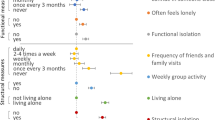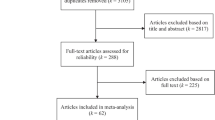Abstract
Home smoking bans reduce exposure to second-hand smoke. Understanding how psychosocial factors are related to having a home smoking ban may lead to better interventions for populations less likely to have home smoking bans, including low-income smokers. In this study, we used baseline data from 1,944 participants in a randomized trial of low-income smokers in Missouri to explore psychosocial correlates of a total home smoking ban. Using logistic regression, we examined associations between psychosocial variables (social support, unmet social needs [e.g., food, housing], perceived stress, and depressive symptoms) and a total home smoking ban. 72% of participants were female, and 58% were Black/African American; 26% reported a home smoking ban. In unadjusted and adjusted models, greater social support was associated with greater likelihood of a home smoking ban. Stress was negatively associated with a ban in adjusted models only. The fact that most participants did not have a home smoking ban highlights the need for further intervention in this population. Results suggest links between social support and having a home smoking ban, although effect sizes were small. Smoke-free home interventions that increase social connectedness or leverage existing support may be especially effective. Tobacco control planners may also consider partnering with agencies addressing social isolation.
Similar content being viewed by others
Availability of data and material
The datasets analyzed during the current study are available from the corresponding author on reasonable request.
Code Availability
Analytic code is provided in a manuscript supplement.
References
Blazer, D. G., Sachs-Ericsson, N., & Hybels, C. F. (2005). Perception of unmet basic needs as a predictor of mortality among community-dwelling older adults. American Journal of Public Health, 95(2), 299–304. doi:https://doi.org/10.2105/ajph.2003.035576
Centers for Disease Control and Prevention (2018). Secondhand smoke (SHS) facts. Retrieved from https://www.cdc.gov/tobacco/data_statistics/fact_sheets/secondhand_smoke/general_facts/index.htm
Cohen, S. (1988). Perceived stress in a probability sample of the United States. In S. Spacapan, & S. Oskamp (Eds.), The Social Psychology of Health. Newbury Park, CA: Sage
Fluharty, M., Taylor, A. E., Grabski, M., & Munafò, M. R. (2017). The association of cigarette smoking with depression and anxiety: A systematic review. Nicotine & Tobacco Research, 19(1), 3–13. doi:https://doi.org/10.1093/ntr/ntw140
Garg, R., McQueen, A., Roberts, C., Butler, T., Grimes, L. M., Thompson, T., & Carpenter, K. M. (2021). Stress, depression, sleep problems and unmet social needs: Baseline characteristics of low-income smokers in a randomized cessation trial. Contemporary Clinical Trials Communications, 24, 100857
GBD 2015 Tobacco Collaborators. (2017). Smoking prevalence and attributable disease burden in 195 countries and territories, 1990–2015: A systematic analysis from the Global Burden of Disease Study 2015. Lancet, 389(10082), 1885–1906. doi:https://doi.org/10.1016/s0140-6736(17)30819-x
Graham, J. W. (2009). Missing data analysis: Making it work in the real world. Annual Review of Psychology, 60, 549–576
Haardörfer, R., Kreuter, M., Berg, C. J., Escoffery, C., Bundy, L. T., Hovell, M., & Kegler, M. C. (2018). Cessation and reduction in smoking behavior: Impact of creating a smoke-free home on smokers. Health Education Research, 33(3), 256–259. doi:https://doi.org/10.1093/her/cyy014
Hahn, E. A., DeWalt, D. A., Bode, R. K., Garcia, S. F., DeVellis, R. F., Correia, H., & Cella, D. (2014). New English and Spanish social health measures will facilitate evaluating health determinants. Health Psychololgy, 33(5), 490–499. doi:https://doi.org/10.1037/hea0000055
Homa, D. M., Neff, L. J., King, B. A., Caraballo, R. S., Bunnell, R. E., Babb, S. D., & Prevention (2015). Vital signs: disparities in nonsmokers’ exposure to secondhand smoke—United States, 1999–2012. Morbidity and Mortality Weekly Report, 64(4), 103–108
Kegler, M. C., Bundy, L., Haardörfer, R., Escoffery, C., Berg, C., Yembra, D., & Burnham, D. (2015). A minimal intervention to promote smoke-free homes among 2-1-1 callers: A randomized controlled trial. American Journal of Public Health, 105(3), 530–537. doi:https://doi.org/10.2105/AJPH.2014.302260
Kegler, M. C., Haardörfer, R., Bundy, L. T., Escoffery, C., Williams, R. S., Hovell, M., & Mullen, P. D. (2019). Moderators of establishing a smoke-free home: Pooled data from three randomized controlled trials of a brief intervention. Journal of Community Health, 44(1), 121–126. doi:https://doi.org/10.1007/s10900-018-0561-6
King, B. A., Patel, R., Babb, S. D., Hartman, A. M., & Freeman, A. (2016). National and state prevalence of smoke-free rules in homes with and without children and smokers: Two decades of progress. Preventive Medicine, 82, 51–58. doi:https://doi.org/10.1016/j.ypmed.2015.11.010
Kreuter, M. W. (2012). Reach, effectiveness, and connections: the case for partnering with 2-1-1 to eliminate health disparities. American Journal of Preventive Medicine, 43(6), S420–S421
Kreuter, M. W., Thompson, T., McQueen, A., & Garg, R. (2021). Addressing social needs in health care settings: Evidence, challenges, and opportunities for public health. Annual Review of Public Health, 42, 329–344. doi:https://doi.org/10.1146/annurev-publhealth-090419-102204
Kroenke, K., Spitzer, R. L., & Williams, J. B. (2003). The Patient Health Questionnaire-2: validity of a two-item depression screener. Medical Care, 41(11), 1284–1292. doi:https://doi.org/10.1097/01.Mlr.0000093487.78664.3c
Kruger, J., Jama, A., Homa, D. M., Babb, S. D., & King, B. A. (2015). Smoke-free home and vehicle rules by tobacco use status among US adults. Preventive Medicine, 78, 9–13. doi:https://doi.org/10.1016/j.ypmed.2015.06.004
McQueen, A., Roberts, C., Garg, R., Caburnay, C., Fu, Q., Gordon, J., & Kreuter, M. (2019). Specialized tobacco quitline and basic needs navigation interventions to increase cessation among low income smokers: Study protocol for a randomized controlled trial. Contemporary Clinical Trials, 80, 40–47. doi:https://doi.org/10.1016/j.cct.2019.03.009
Mills, A. L., Messer, K., Gilpin, E. A., & Pierce, J. P. (2009). The effect of smoke-free homes on adult smoking behavior: A review. Nicotine & Tobacco Research, 11(10), 1131–1141. doi:https://doi.org/10.1093/ntr/ntp122
Oberg, M., Jaakkola, M. S., Woodward, A., Peruga, A., & Prüss-Ustün, A. (2011). Worldwide burden of disease from exposure to second-hand smoke: A retrospective analysis of data from 192 countries. Lancet, 377(9760), 139–146. doi:https://doi.org/10.1016/s0140-6736(10)61388-8
Office of Disease Prevention and Health Promotion (2021). Healthy People 2020 tobacco use. Retrieved from https://www.healthypeople.gov/2020/topics-objectives/topic/tobacco-use/objectives
Parks, M. J., Kingsbury, J. H., Boyle, R. G., & Evered, S. (2018). Smoke-free rules in homes and cars among smokers and nonsmokers in Minnesota. Preventing Chronic Disease, 15, E32. doi:https://doi.org/10.5888/pcd15.170355
Passey, M. E., Longman, J. M., Robinson, J., Wiggers, J., & Jones, L. L. (2016). Smoke-free homes: What are the barriers, motivators and enablers? A qualitative systematic review and thematic synthesis. BMJ Open, 6(3), e010260. doi:https://doi.org/10.1136/bmjopen-2015-010260
Pelekanakis, A., O’Loughlin, J. L., Maximova, K., Montreuil, A., Kalubi, J., Dugas, E. N., & Sylvestre, M. P. (2021). Associations of quantity smoked and socioeconomic status with smoke-free homes and cars among daily smokers. Health Education & Behavior, 10901981211010437. doi:https://doi.org/10.1177/10901981211010437
Poghosyan, H., Moen, E. L., Kim, D., Manjourides, J., & Cooley, M. E. (2019). Social and structural determinants of smoking status and quit attempts among adults living in 12 US states, 2015. American Journal of Health Promotion, 33(4), 498–506. doi:https://doi.org/10.1177/0890117118792827
Schäfer, A. A., Santos, L. P., Quadra, M. R., Dumith, S. C., & Meller, F. O. (2022). Alcohol consumption and smoking during Covid-19 pandemic: Association with sociodemographic, behavioral, and mental health characteristics. Journal of Community Health. doi:https://doi.org/10.1007/s10900-022-01085-5
Segal, S. P., Silverman, C., & Temkin, T. (1993). Empowerment and self-help agency practice for people with mental disabilities. Social Work, 38(6), 705–712
Stuber, J., Galea, S., & Link, B. G. (2009). Stigma and smoking: The consequences of our good intentions. Social Service Review, 83(4), 585–609
Thompson, T., McQueen, A., Croston, M., Luke, A., Caito, N., Quinn, K., & Kreuter, M. W. (2019). Social needs and health-related outcomes among Medicaid beneficiaries. Health Education & Behavior, 46(3), 436–444. doi:https://doi.org/10.1177/1090198118822724
Umberson, D., Crosnoe, R., & Reczek, C. (2010). Social relationships and health behavior across the life course. Annual Review of Sociology, 36, 139–157. doi:https://doi.org/10.1146/annurev-soc-070308-120011
van Buuren, S., & Groothuis-Oudshoorn, K. (2011). MICE: Multivariate imputation by chained equations in R. Journal of Statistical Software, 45(1), 1–67
van den Brand, F. A., Nagtzaam, P., Nagelhout, G. E., Winkens, B., & van Schayck, C. P. (2019). The association of peer smoking behavior and social support with quit success in employees who participated in a smoking cessation intervention at the workplace. International Journal of Environmental Research and Public Health, 16(16), doi:https://doi.org/10.3390/ijerph16162831
Wang, I. J., Tung, T. H., Tang, C. S., & Zhao, Z. H. (2016). Allergens, air pollutants, and childhood allergic diseases. The International Journal of Hygiene and Environmental Health, 219(1), 66–71. doi:https://doi.org/10.1016/j.ijheh.2015.09.001
Funding
This study was funded by the National Cancer Institute (R01CA201429; PI: Kreuter; R01CA235773; mPI: Kreuter, McQueen).
Author information
Authors and Affiliations
Contributions
Tess Thompson: Conceptualization; formal analysis; methodology; writing-original draft; writing-review and editing.
Ebuwa Evbuoma-Fike: Conceptualization; formal analysis; methodology; writing-original draft; writing-review and editing.
Rachel Garg: Conceptualization; data curation; formal analysis; investigation; methodology; writing-original draft; writing-review and editing.
Amy McQueen: Conceptualization; funding acquisition; data curation; methodology; supervision; writing—review and editing.
Charlene Caburnay: Conceptualization; funding acquisition; investigation; methodology; project administration; supervision; writing-review and editing.
Matthew Kreuter: Conceptualization; funding acquisition; methodology; project administration; resources; supervision; writing-review and editing.
Corresponding author
Ethics declarations
Conflicts of interest/competing interests
The authors have no relevant financial or non-financial interests to disclose.
Ethics approval
This study was approved by the Human Research Protection Office at Washington University in St. Louis.
Consent to participate
All study participants provided informed consent.
Consent for publication
Not applicable.
Additional information
Publisher’s note
Springer Nature remains neutral with regard to jurisdictional claims in published maps and institutional affiliations.
Electronic supplementary material
Below is the link to the electronic supplementary material.
Rights and permissions
About this article
Cite this article
Thompson, T., Evbuoma-Fike, E.I., Garg, R. et al. Examining Psychosocial Correlates of a Home Smoking Ban Among Low-income Smokers: Analysis of Social Support, Unmet Social Needs, Perceived Stress, and Depressive Symptoms. J Community Health 47, 959–965 (2022). https://doi.org/10.1007/s10900-022-01094-4
Accepted:
Published:
Issue Date:
DOI: https://doi.org/10.1007/s10900-022-01094-4




